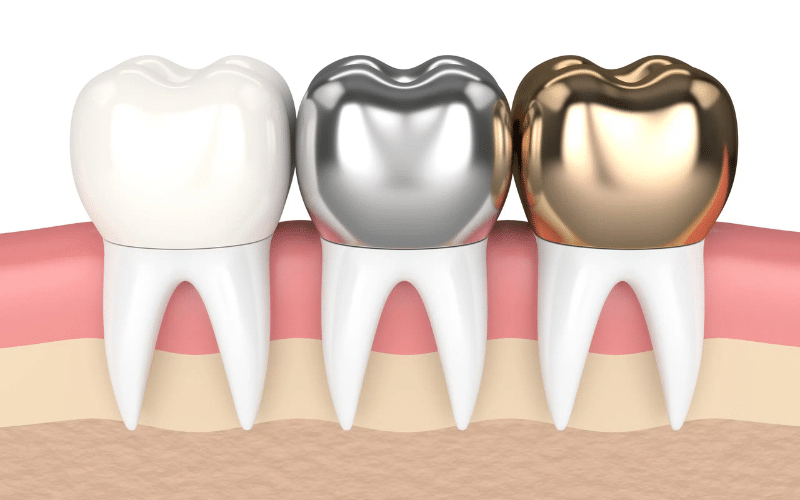4801 Southern Hills Dr, Sioux City, IA 51106, USA

A beautiful smile is a powerful asset, and one of the keys to maintaining it is good oral health. However, dental issues can arise over time, leading to the need for restorative procedures. Dental crowns are one such solution that can help restore your smile’s function and appearance. In this comprehensive guide, we’ll explore what dental crowns are, why they are necessary, the different types available, the procedure involved, aftercare, and the benefits they off
What Are Dental Crowns?
Dental crowns, often referred to as dental caps, are custom-made tooth-shaped restorations that cover the visible portion of a damaged or weakened tooth. They are designed to protect and strengthen the tooth while restoring its natural shape and appearance. Crowns are commonly used when a tooth is too damaged for a filling but don’t require extraction.
Why Are Dental Crowns Necessary?
Several situations may necessitate the use of dental crowns:
- Tooth Decay: When a tooth has extensive decay and a filling can’t adequately restore its structure, a crown is used to provide additional support.
- Fractured or Cracked Teeth: Teeth that are fractured, cracked, or weakened due to injury or wear and tear benefit from the protection and reinforcement provided by crowns.
- Root Canal Treatment: After a root canal procedure, a crown is often placed on the treated tooth to strengthen it and protect it from further damage.
- Cosmetic Enhancements: Crowns can be used for cosmetic purposes to improve the appearance of misshapen, discolored, or poorly sized teeth.
- Dental Implants: Crowns are placed on top of dental implants to replace missing teeth, restoring both function and aesthetics.
Types of Dental Crowns
There are several types of dental crowns available, each with its own set of advantages and considerations:
- Porcelain Crowns
Porcelain crowns are highly popular due to their natural appearance. They mimic the translucency and color of natural teeth, making them an ideal choice for visible teeth. However, they may not be as durable as some other materials.
- Metal Crowns
Metal crowns, typically made of gold or silver alloys, are known for their strength and durability. They are often used for molars that require significant chewing force. However, their metallic color makes them less suitable for front teeth.
- Ceramic Crowns
Ceramic crowns offer a compromise between porcelain and metal. They are strong, durable, and can be made to closely match the color of your natural teeth. Ceramic crowns are a popular choice for both front and back teeth.
- Zirconia Crowns
Zirconia crowns are known for their strength and biocompatibility. They are a popular choice for both cosmetic and functional reasons, providing natural-looking results.
- Resin Crowns
Resin crowns are typically less expensive than other materials, but they may not be as durable and may wear down over time. They are often used as temporary crowns or for less visible teeth.
The Dental Crown Procedure
Let’s discuss the procedure of Dental Crown below:
- Consultation And Assessment
The process of getting a dental crown typically involves several steps. It begins with a consultation with your dentist, during which they will assess your oral health, discuss treatment options, and determine if a crown is the best solution for your situation.
- Tooth Preparation
If a crown is deemed necessary, the tooth in question will be prepared. This involves removing any decay, shaping the tooth to accommodate the crown, and taking impressions for the custom crown to be created.
- Temporary Crown
While your permanent crown is being fabricated, a temporary crown may be placed to protect the prepared tooth. It’s essential to take care of this temporary crown and avoid chewing on hard or sticky foods.
- Crown Placement
Once the permanent crown is ready, typically within a couple of weeks, you will return to your dentist for the final crown placement. The dentist will ensure the crown fits properly, matches your natural teeth, and functions correctly. Once satisfied, they will permanently cement the dental crown in place.
Aftercare and Maintenance
Aftercare and maintenance are crucial aspects of ensuring the long-term success of your dental crown. To keep your crown in optimal condition, prioritize good oral hygiene practices. Brush your teeth at least twice daily with a soft-bristle toothbrush and fluoride toothpaste, paying extra attention to the area around the crown to remove plaque and food debris. Floss gently and regularly to clean between teeth and along the gumline, preventing gum disease that could affect the crown’s stability. Incorporating an antimicrobial mouthwash into your routine can further aid in maintaining oral health. Avoid chewing on hard objects or excessively sticky foods, as they can potentially damage the crown. Lastly, maintain regular dental checkups every six months or as recommended by your dentist to monitor the condition of your crown, address any emerging issues early, and ensure the overall health of your smile. With proper care and attention, your dental crown can provide years of functional and aesthetic benefits.
The Benefits of Dental Crowns
Let’s see some benefits of Dental Crown in below:
- Restored Functionality
Dental crowns restore the function of a damaged or weakened tooth, allowing you to chew and speak comfortably again.
- Aesthetic Enhancement
Crowns can significantly improve the appearance of your smile, especially if you have discolored, misshapen, or poorly sized teeth.
- Durability
Depending on the material used, dental crowns can be highly durable, lasting for many years with proper care.
- Preservation Of Natural Teeth
Crowns can often save a tooth that might otherwise require extraction, preserving your natural smile.
- Enhanced Confidence
A beautiful smile can boost your confidence and self-esteem, and dental crowns play a significant role in achieving this.
Conclusion
Dental crowns are versatile restorations that offer both functional and aesthetic benefits. Whether you require a crown due to decay, injury, or cosmetic concerns, understanding the different types, the procedure involved, and proper aftercare is essential to ensure the longevity of your crown and the health of your smile. By working closely with your dentist in Sioux City and maintaining good oral hygiene, you can enjoy the benefits of a beautiful and functional smile for years to come.



